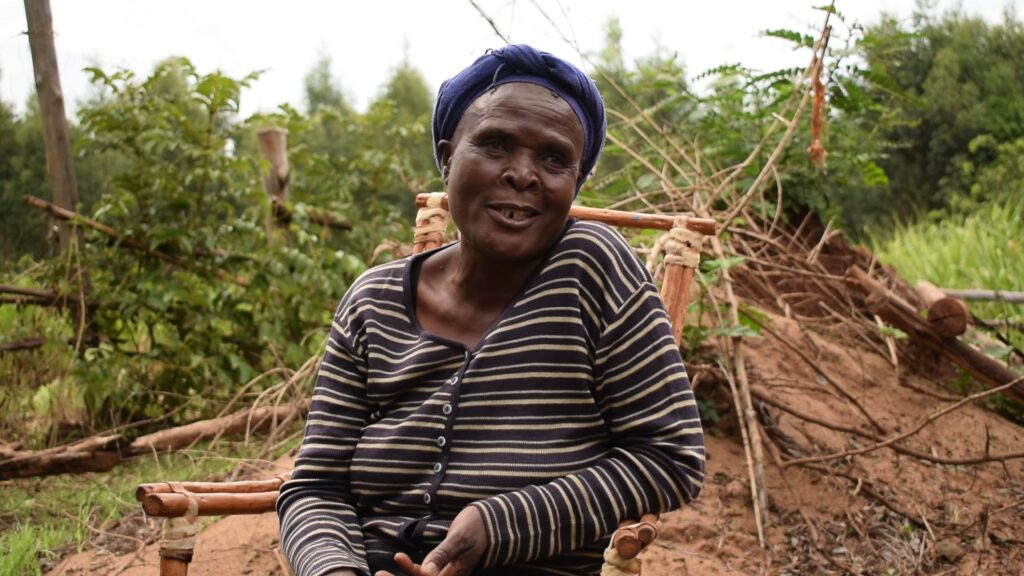With only a smartphone and several remote training courses, Jane Nanyama and the other participants of Cordaid’s Agribusiness Leadership Programme, have been able to quickly professionalise their farming cooperatives. This contemporary and innovative approach gives Kenyan women the means to break free from patriarchal structures.
Jane was born in 1958, in Bungoma County. Like many girls born and raised in low socio-economic circumstances, she was bound to live a life full of adversity, struggle, and missed opportunities. She divorced her husband in 1984 and raised five children.
Sneaking into nursery school
“My father was a follower of the late Elija Wa Msambwa, the founder Dini Ya Msambwa, a traditional religion that prohibited parents from enrolling their children at school”, Jane says. “My mom tried sneaking us into a nursery school, but when my father discovered this, he dragged us home and beat us up. He would threaten my mom. My ex-husband, however, was educated. At least he taught me how to write.”
“This phone has changed my life. I can follow the training at home; a privilege I thought was only for those who are educated, the younger generation. And men, mostly.”
Now, Jane is the co-founder and the current vice-chairperson of the Marakusi Mali Shambani Cooperative. The Cooperative is an umbrella body formed out of the convergence of several smallholder farmer groups. Being part of a cooperative taught her the skills and traits of a successful agribusiness owner and helped her obtain a plot of land on which she now works and lives.

Resolving conflicts
The Agribusiness Leadership Programme offers Jane and 69 other heads of the cooperatives in the area digital training courses they can follow at home. The training helps the participants manage group dynamics and resolve conflicts amongst the cooperative members, lowering the dropout rates.
“The training method is easy to understand because it is in my own language and it uses videos and pictures to explain everything.”
Jane talks about her first experience with the programme: “We were invited to attend a training and the staff had brought smartphones. I thought they were trying to sell them to us. It turned out we could take them with us, for free. This phone has changed my life. I can follow the training at home; a privilege I thought was only for those who are educated, the younger generation. And men, mostly.”
Staying up to speed
She says her phone also helps bridge important knowledge gaps, by allowing her to always be informed about the latest developments in agribusiness through reliable online sources. “The training method is easy to understand because it is in my own language and it uses videos and pictures to explain everything. I also stay up to speed on events that can impact our businesses, like the ongoing anti-government protests.”
Despite the hardship she experienced and the lack of formal schooling, Jane now exhibits exceptional leadership skills. She is a committed community leader and will remain a strong advocate for the economic empowerment of women.
STARLIT
The Agribusiness Leadership Programme (ALP) is part of a larger project called Strengthening Agricultural Resilience Through Learning and Innovation (STARLIT).
The International Finance Corporation’s ALP curriculum was a key component of the STARLIT project in Kenya. The IFC is a member of the World Bank Group and offers a wide variety of financial products for private sector projects in developing countries. Notably, the curriculum is one of the standard tools available in the Agribusiness Market Ecosystems Alliance toolbox.
The programme supports 2,800 smallholder farmers (45% women, 40% youth) in Rwanda and Kenya by facilitating access to digital information, financial services, markets and mechanisation.
In Rwanda, STARLIT works with 2,000 maize farmers in the drought-prone Kayonza district. In Kenya, the project supports 800 maize farmers in the western county of Kakamega.
STARLIT is funded by the International Fund for Agricultural Development (IFAD).
